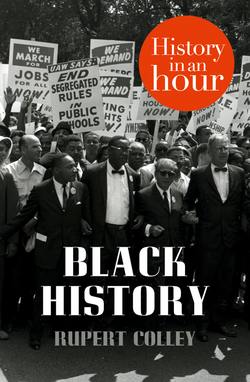Читать книгу Black History: History in an Hour - Rupert Colley - Страница 9
ОглавлениеWar and Emancipation:
‘Previous condition of servitude’
Slavery may have been the cause of the civil war but Lincoln did not go to war specifically for the benefit of the slave. Instead, his ‘paramount’ objective was to save the Union: ‘If I could save the Union,’ he wrote in 1862, ‘without freeing any slave I would do it, and if I could save it by freeing all the slaves I would do it; and if I could save it by freeing some and leaving others alone I would also do that.’
Many slaves fled from their masters, emigrated north and joined the Union army, but Lincoln, mindful not to upset the border states between North and South, was initially reluctant to enlist blacks. In late 1862, however, he relented and through the Militia Act permitted African-Americans into the Union army.
In September 1862, Lincoln issued the Emancipation Proclamation which stated that as from 1 January 1863, all slaves in the Confederate States (but not the border states) would be free. Southern slave owners ignored the proclamation, but nonetheless, at the turn of the New Year, thousands of slaves fled to the Union, and cities like New York were suddenly overwhelmed with African-Americans. Much of the white population in the North resented having to fight for the benefit of blacks who then engulfed their cities, threatening their livelihoods by offering cheaper labour. As New York and other Northern cities descended into race riots, Lincoln prepared to end slavery throughout the country.
In his Gettysburg Address in November 1863, Lincoln talked of the need to preserve a ‘nation conceived in liberty and dedicated to the proposition that all men are created equal’.
In April 1865, after four years of civil war, the Union emerged victorious. At the end of the war, there were 185,000 blacks in the Union army, and around twenty black soldiers had received the Congressional Medal of Honour. But Lincoln was still concerned that emancipation did not cover the whole nation and that the former Confederate States might see it as merely a temporary measure of war. Therefore, on 6 December 1865, ten months after its proposal and following the Union’s victory, the Thirteenth Amendment to the US Constitution was ratified: ‘Neither slavery nor involuntary servitude shall exist within the United States, or any place subject to their jurisdiction.’ Slavery, this peculiar institution, had finally been abolished.
Lincoln put together a plan to aid the economic and political recovery of the South and to help the 4 million former slaves as they adapted to their new lives as ‘freedmen’. In March 1865, during the last weeks of the war, Lincoln had set up an agency, the Freedman’s Bureau, whose purpose was to aid the freedmen. The task, once the war was over, was immense. The freed slaves needed, at the most basic level, food, provisions and shelter, and, for the wounded soldiers, medical supplies. But it was the longer-term objectives that proved so difficult in the immediate post-war years of Reconstruction – the renting of land, access to education, and laying the foundations for the rebuilding of lives.
